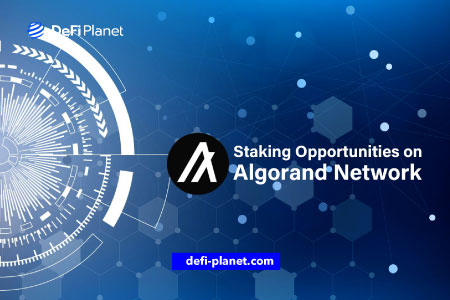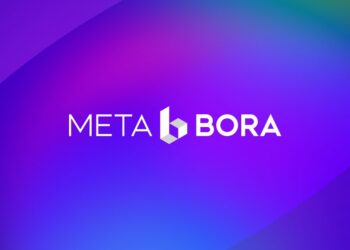The Algorand mainnet network and its native currency, ALGO, were launched in June 2019. The Algorand blockchain was designed to address common issues of scalability, speed, and security faced by other blockchains while maintaining a level of decentralization.
To achieve this, Algorand employs its “Pure Proof-of-Stake” (PPoS) consensus mechanism, which allows any user to participate in staking and become a validator.
This article comprehensively explores the intricacies of Algorand staking and provides an overview of the PPoS process.
What is Algorand?
Algorand stands out among decentralized blockchain networks due to its unique Proof-of-Stake protocol and focus on environmental sustainability. Decentralization, security, and speed are ongoing challenges in the blockchain and cryptocurrency industry, and Algorand is working to provide practical solutions to these issues.
Staking has become a significant aspect of the blockchain world. It involves securing a certain amount of cryptocurrency assets in exchange for rewards. The native token of Algorand, ALGO, is one of the tokens that can be staked to earn passive income. Stakers, similar to validators, help maintain the integrity of the blockchain network.

What is Staking?
Staking refers to the process of holding a cryptocurrency in a wallet to support the operation of a blockchain network in return for payment. Algorand’s Pure Proof-of-Stake consensus mechanism relies on the honesty of its users to maintain the security of the network.
In Algorand, it is impossible for a minority to act dishonestly, and it would be irrational for a majority to cheat. The method is reliable as long as the majority is truthful (at least two-thirds of the stakers).
How Algorand Staking Works
The Algorand blockchain is a Pure Proof-of-Stake network that makes it easy for anyone to join and prevents fake profiles from infiltrating the network. The Algorand blockchain relies heavily on staking to function reliably and efficiently.
Staking ALGO tokens entails locking up one’s ALGO tokens in exchange for passive income. This method of passive income generation may vary depending on the platform where staking occurs.
Procedure for Pure Proof-of-Stake Staking
As part of its Proof-of-Stake protocol, Algorand randomly selects a node to verify all the transactions in the new block. Anyone with at least 1 ALGO can stake and receive a participation key to become a Participation Node.
Afterwards, they will be able to submit proposals for the protocol and cast votes on them.
The staking process involves several phases, which include:
Proposal Phase
After users have staked their coins and become participation nodes, the Algorand Verifiable Random Function (VRF) mechanism selects a group of block proposers that will propose a new block. The VRF function selects a node at random based on the relative size of the stakes placed by the various participation nodes.
The VRF selects the block proposers in secret and gives each of them a private participation key to propose the block, adding an extra layer of security to the process. The consensus mechanism prevents a scenario in which attackers target the randomly selected block proposers to gain access to the network. On the other hand, the block proposers still have cryptographic proof that establishes beyond any reasonable doubt that they are the block proposers.
Voting Phase
The voting phase begins once all the block proposers have put forth their ideas. During the voting phase, a group of nodes from the participation pool is formed to evaluate the submitted proposals and select new block producers. The committee will choose a proposal that has a block with the lowest VRF hash value.
The voting committee also needs to know how much each node has staked to participate. Each node’s voting power is proportional to its stake in the network. Blocks can proceed to the next phase once the committee has verified that all of the transactions within them are legitimate.
Final Vote Stage
Once a block has been selected, a new committee is formed to check for double-spending and other issues that could jeopardize the legitimacy of the transactions within it. The block is added to the blockchain after the committee verifies it.
When a block is added to the blockchain, all associated transactions become irreversible. The idea of a fork in Algorand is widely disregarded because only one block can get to the final vote stage at a time.
If the committee finds malicious activity during attestation, the Algorand system diverges from the standard Proof-of-Stake platform by going into “recovery mode.” In this mode, the corrupted block is thrown away, and new block proposers are chosen so that the process can continue.
Due to its lack of a slashing process, the Algorand consensus mechanism opts for this course of action by simply rejecting the bad actor and re-voting. If the person in charge of the next block is honest and makes a block that the voting committees agree is authentic, then that block is confirmed, and the process for making the next block can begin.
Algorand Staking on Exchanges
It is easy to stake ALGO on an exchange. There are staking incentives available on the user’s ALGO balance at most major exchanges; all that is required is to sign up for this service.
For instance, Coinbase users must enable the feature in their account settings and accept the terms of service so that they can receive staking rewards. Coinbase takes a portion of the staking profits if the user decides to keep their bitcoins on the network.
Compared to Coinbase, Binance takes a smaller portion of the profits from ALGO staking. Binance, on the other hand, has a poor reputation regarding customer service and offers fewer features to users in the United States.
Though the annual percentage yield (APY) on Crypto.com’s soft-staking for ALGO balances is low compared to other exchanges, it is still an option for users.
Users of the exchange Kraken can’t earn staking rewards on their ALGO balance. The best way Kraken users can earn incentives is to transfer their ALGO to a crypto wallet.
How to Stake Algorand
Staking on My Algo Wallet
Since MyAlgo Wallet is not a “custodial” wallet, it is possible to retain complete control over one’s money and receive all rewards directly. This is a fantastic option for those who wish to avoid KYC/AML processes, but it is crucial to remember that the user is responsible for the safety of their assets.
Here are the steps for staking ALGO on My Algo Wallet:
- Go to MyAlgo.com
- Select “Access My Algo Wallet” from the drop-down menu.
- Create a password that is easy to remember.
- Navigate to the “Create wallet” button in the upper right-hand corner of the dashboard.
- A mnemonic phrase consisting of 25 words will be generated for you. Please keep it in a secure location, preferably in writing.
- Click “Continue.”
- Complete the confirmation test and then click “Create wallet.”
- Add an account to the My Algo Wallet.
- Buy at least 1 ALGO to start earning rewards.
Trust Wallet, Exodus, and hardware wallets like the Ledger Nano are some of the other non-custodial wallets that support Algorand staking.
Staking on Binance
- Keep at least 100 ALGO in a “spot” wallet.
- Click the “Earn” button. This can be found on the right side of the ALGO row.
- To stake an amount of ALGO, select and confirm the desired amount.
- Click “Lock Stake” (you will find this in the drop-down menu) and follow the on-screen prompts.
Rewards will be earned as ALGO coins in the wallet. These rewards can either be withdrawn immediately or used to trade.
In Conclusion
- Algorand enables all ALGO holders to participate in the staking process and earn passive income, regardless of the amount they hold.
- In addition to Algorand, there are other promising staking-based networks, such as Ethereum, which is the most widely used blockchain platform for decentralized applications and currently employs a Proof-of-Stake consensus mechanism.
- It is uncertain which blockchain platform will ultimately become the most popular or if there will be multiple platforms in widespread use. However, Algorand is a strong contender.
- The stablecoin USD Coin (USDC) plans to utilize Algorand, which is a positive development for the Algorand project as USDC is one of the largest stablecoins and is accepted for tax payments in Bermuda.
Disclaimer: This article is intended solely for informational purposes and should not be considered trading or investment advice. Nothing herein should be construed as financial, legal, or tax advice. Trading or investing in cryptocurrencies carries a considerable risk of financial loss. Always conduct due diligence.
If you would like to read more articles like this, visit DeFi Planet and follow us on Twitter, LinkedIn, Facebook, and Instagram.
“Take control of your crypto portfolio with MARKETS PRO, DeFi Planet’s suite of analytics tools.”





















